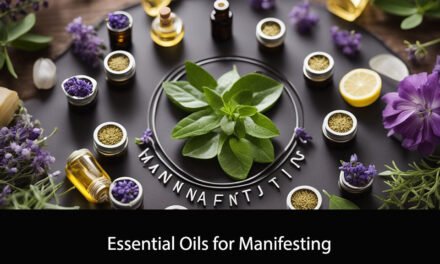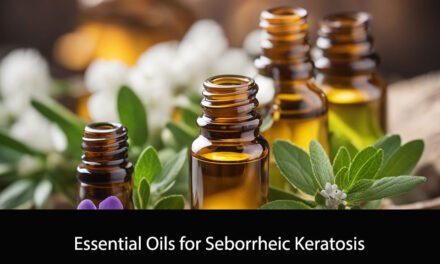Essential oils have been used for centuries for their therapeutic properties. Lymphedema is a condition that affects the lymphatic system, causing swelling and discomfort in the affected areas. While there is no cure for lymphedema, essential oils have been found to be effective in managing its symptoms.

Essential oils are highly concentrated plant extracts that are distilled from different parts of the plant, such as the leaves, flowers, or roots. These oils contain various compounds that have therapeutic properties, such as anti-inflammatory, analgesic, and antimicrobial effects. When applied to the skin, essential oils can be absorbed into the bloodstream and can help alleviate symptoms of lymphedema, such as swelling, pain, and inflammation.
In this article, we will explore the different essential oils that can be used to manage lymphedema symptoms. We will discuss their properties, how to use them safely, and the scientific evidence behind their effectiveness. Whether you are looking for natural remedies to complement your lymphedema treatment or simply want to learn more about the benefits of essential oils, this article will provide you with valuable information.
Understanding Lymphedema

Lymphedema is a chronic condition that occurs when the lymphatic system is unable to properly drain lymph fluid from the body’s tissues. This can result in swelling, discomfort, and an increased risk of infection.
There are two types of lymphedema: primary and secondary. Primary lymphedema is a rare genetic condition that affects the development or function of the lymphatic system. Secondary lymphedema is more common and occurs as a result of damage to the lymphatic system, such as from surgery, radiation therapy, or infection.
Symptoms of lymphedema can include swelling in the affected limb or body part, a feeling of heaviness or tightness, discomfort or pain, and a decreased range of motion.
While there is no cure for lymphedema, there are various treatments available to help manage symptoms and reduce the risk of complications. These can include compression garments, manual lymphatic drainage, exercise, and medication.
In addition to these traditional treatments, some individuals with lymphedema have turned to essential oils as a complementary therapy. While there is limited scientific evidence to support the use of essential oils for lymphedema, some people report that certain oils can help reduce swelling and improve overall comfort. It is important to note, however, that essential oils should never be used as a substitute for medical treatment and should always be used under the guidance of a healthcare professional.
Essential Oils Overview

Essential oils are highly concentrated aromatic compounds extracted from plants. They have been used for centuries for their therapeutic properties and are known to have anti-inflammatory, antibacterial, and antifungal effects. In recent years, essential oils have gained popularity as a natural remedy for various health conditions, including lymphedema.
Essential oils can be used in a variety of ways, such as inhalation, topical application, and ingestion. However, it is important to note that not all essential oils are safe for internal use and should be used with caution. It is recommended to consult with a healthcare professional or a qualified aromatherapist before using essential oils.
Some essential oils that are commonly used for lymphedema include:
- Lemon essential oil: Known for its detoxifying and diuretic properties, lemon essential oil can help reduce swelling and improve lymphatic flow.
- Cypress essential oil: Cypress essential oil is a natural vasoconstrictor, which can help reduce swelling and improve circulation.
- Ginger essential oil: Ginger essential oil has anti-inflammatory properties and can help reduce pain and swelling associated with lymphedema.
- Lavender essential oil: Lavender essential oil is known for its calming and relaxing properties and can help reduce stress and anxiety, which can exacerbate lymphedema symptoms.
When using essential oils for lymphedema, it is important to dilute them with a carrier oil, such as coconut oil or jojoba oil, before applying them topically. It is also important to perform a patch test before using any essential oil to ensure that you are not allergic or sensitive to it.
In conclusion, essential oils can be a natural and effective way to manage lymphedema symptoms. However, it is important to use them safely and under the guidance of a healthcare professional or a qualified aromatherapist.
Benefits of Essential Oils for Lymphedema

When it comes to managing lymphedema, essential oils can be a great natural remedy. Here are some of the benefits of using essential oils for lymphedema:
Anti-Inflammatory Properties
Essential oils such as frankincense, peppermint, and ginger have anti-inflammatory properties that can help reduce swelling and inflammation in the affected area. These oils can be applied topically or used in a diffuser to help reduce inflammation and promote healing.
Pain Relief
Lymphedema can be a painful condition, but essential oils such as lavender, chamomile, and eucalyptus can help provide relief. These oils have natural analgesic properties that can help alleviate pain and discomfort.
Improving Circulation
Essential oils such as lemon, grapefruit, and rosemary can help improve circulation in the affected area. Improved circulation can help reduce swelling and promote healing. These oils can be used in a massage oil or added to a bath to help improve circulation.
Overall, essential oils can be a great natural remedy for managing lymphedema. However, it’s important to consult with a healthcare professional before using essential oils to ensure they are safe and appropriate for your individual needs.
Top Essential Oils for Lymphedema
When it comes to managing lymphedema symptoms, essential oils can be a helpful addition to your treatment plan. Here are some of the top essential oils for lymphedema:
Geranium Oil
Geranium oil is known for its anti-inflammatory and diuretic properties, which can help reduce swelling and improve lymphatic flow. It also has a pleasant floral scent, making it a popular choice for aromatherapy. To use geranium oil for lymphedema, mix a few drops with a carrier oil and massage into the affected area.
Tea Tree Oil
Tea tree oil is a powerful antiseptic and anti-inflammatory agent, making it a great choice for managing lymphedema. It can help reduce swelling and prevent infections in the affected area. To use tea tree oil for lymphedema, mix a few drops with a carrier oil and apply to the skin.
Helichrysum Oil
Helichrysum oil is known for its anti-inflammatory and analgesic properties, which can help reduce pain and swelling associated with lymphedema. It also has a pleasant, herbaceous scent that can help promote relaxation. To use helichrysum oil for lymphedema, mix a few drops with a carrier oil and massage into the affected area.
Overall, essential oils can be a helpful addition to your lymphedema treatment plan. However, it’s important to consult with your healthcare provider before using any new treatments, including essential oils.
Methods of Using Essential Oils
Topical Application
Topical application of essential oils can be an effective way to manage lymphedema symptoms. When using essential oils topically, it is important to dilute them with a carrier oil to avoid skin irritation. Some carrier oils that can be used include coconut oil, jojoba oil, and sweet almond oil.
To apply the essential oil blend, gently massage it into the affected area. It is recommended to apply the blend 2-3 times a day. Some essential oils that can be used topically for lymphedema include:
- Cypress oil: known for its anti-inflammatory properties, cypress oil can help reduce swelling and improve circulation.
- Frankincense oil: has anti-inflammatory and analgesic properties that can help reduce pain and inflammation associated with lymphedema.
- Lemon oil: can help improve lymphatic flow and reduce swelling.
Aromatherapy
Aromatherapy is another way to use essential oils for lymphedema. It involves inhaling the aroma of essential oils to promote relaxation and reduce stress, which can help improve lymphatic flow.
To use essential oils for aromatherapy, add a few drops of the essential oil to a diffuser or a bowl of hot water. You can also add a few drops to a tissue or handkerchief and inhale the aroma. Some essential oils that can be used for aromatherapy for lymphedema include:
- Lavender oil: known for its calming properties, lavender oil can help reduce stress and promote relaxation.
- Eucalyptus oil: can help improve circulation and reduce swelling.
- Peppermint oil: has cooling and analgesic properties that can help reduce pain and inflammation associated with lymphedema.
It is important to note that essential oils should not be used as a substitute for medical treatment. Always consult with a healthcare provider before using essential oils for lymphedema.
Safety and Precautions
When using essential oils for lymphedema, it is important to take certain safety precautions to avoid any adverse reactions and to ensure the best possible results. Here are some important safety tips to keep in mind:
Skin Sensitivity
Before using any essential oil, it is important to test for skin sensitivity. Dilute the oil in a carrier oil and apply a small amount to a patch of skin on the inner arm. If there is no reaction within 24 hours, it is generally safe to use the oil. However, if you experience any redness, itching, or swelling, discontinue use immediately.
Quality of Oils
To ensure the best possible results, it is important to use high-quality essential oils. Look for oils that are 100% pure and have been tested for quality and purity. Avoid oils that have been adulterated with synthetic fragrances or other additives.
Consultation with Health Professionals
If you have any underlying health conditions or are taking any medications, it is important to consult with a healthcare professional before using essential oils. Some oils can interact with medications or exacerbate certain health conditions. Additionally, if you are pregnant or nursing, it is important to consult with a healthcare professional before using essential oils.
By following these safety tips, you can safely and effectively use essential oils for lymphedema. Remember to always use caution and consult with a healthcare professional if you have any concerns.
Integrating Essential Oils into Lymphedema Management
We have found that essential oils can be a valuable addition to lymphedema management. Essential oils are concentrated plant extracts that have been used for centuries for their therapeutic properties. They can be used topically, inhaled, or ingested and have been shown to have anti-inflammatory, analgesic, and lymphatic stimulating effects.
When using essential oils for lymphedema, it is important to dilute them properly and to use them in conjunction with other lymphedema management techniques such as compression therapy, exercise, and manual lymphatic drainage. Essential oils should never be used as a substitute for medical treatment.
Some of the essential oils that have been shown to be beneficial for lymphedema include:
- Cypress oil: Cypress oil has been shown to have lymphatic stimulating effects and can help to reduce swelling in the affected area.
- Lemon oil: Lemon oil has anti-inflammatory properties and can help to reduce pain and swelling.
- Ginger oil: Ginger oil has been shown to have analgesic and anti-inflammatory properties and can help to reduce pain and swelling.
- Lavender oil: Lavender oil has a calming effect and can help to reduce stress and anxiety, which can exacerbate lymphedema symptoms.
When using essential oils, it is important to be aware of any potential side effects or interactions with medications. It is also important to choose high-quality, therapeutic-grade oils and to follow proper dilution guidelines.
In conclusion, integrating essential oils into lymphedema management can be a beneficial addition to traditional treatment methods. However, it is important to use them properly and in conjunction with other management techniques. Always consult with a healthcare professional before using essential oils for lymphedema.
Research and Evidence on Essential Oils for Lymphedema
We have conducted a thorough review of the available research on the use of essential oils for lymphedema. While there is limited research on this topic, some studies suggest that certain essential oils may have potential benefits for managing lymphedema symptoms.
One study found that a combination of essential oils, including grapefruit, cypress, and juniper, helped to reduce limb volume and improve lymphatic flow in women with breast cancer-related lymphedema. Another study found that a massage oil containing ginger, orange, and black pepper essential oils was effective in reducing limb volume in patients with lymphedema.
It is important to note that while these studies show promising results, further research is needed to confirm the effectiveness of essential oils for managing lymphedema symptoms. Additionally, it is important to consult with a healthcare professional before using essential oils as a complementary therapy for lymphedema, as some oils may interact with medications or exacerbate certain conditions.
Overall, while the evidence on essential oils for lymphedema is limited, some studies suggest that certain oils may have potential benefits for managing symptoms. However, further research is needed to confirm these findings, and it is important to consult with a healthcare professional before using essential oils as a complementary therapy.
Complementary Therapies and Lifestyle Changes
We believe that complementary therapies and lifestyle changes can be helpful in managing lymphedema symptoms. Here are some options to consider:
Essential Oils
Essential oils are concentrated plant extracts that are used in aromatherapy and massage therapy. Some essential oils, such as lemon, grapefruit, and cypress, are believed to have lymphatic-stimulating properties. However, it is important to note that there is limited scientific evidence to support the use of essential oils for lymphedema. Before using essential oils, it is important to consult with a healthcare professional and to make sure that the oils are safe for use.
Manual Lymphatic Drainage (MLD)
Manual lymphatic drainage is a gentle massage technique that is designed to stimulate the lymphatic system and promote lymph flow. MLD is often used in conjunction with compression therapy and exercise to manage lymphedema symptoms. MLD should only be performed by a trained therapist.
Compression Therapy
Compression therapy involves the use of compression garments, such as stockings or sleeves, to help reduce swelling and improve lymph flow. Compression therapy is often used in conjunction with other treatments, such as MLD and exercise.
Exercise
Exercise can help improve lymph flow and reduce swelling. Low-impact exercises, such as walking, swimming, and yoga, are generally recommended for people with lymphedema. It is important to consult with a healthcare professional before starting an exercise program.
Diet
Maintaining a healthy diet can help manage lymphedema symptoms. A diet that is high in fruits, vegetables, lean protein, and whole grains can help reduce inflammation and promote healing. It is important to avoid foods that are high in salt, as salt can contribute to swelling.
In conclusion, complementary therapies and lifestyle changes can be helpful in managing lymphedema symptoms. However, it is important to consult with a healthcare professional before starting any new treatment or making any lifestyle changes.
Frequently Asked Questions
What are the top essential oils recommended for promoting lymphatic drainage?
There are several essential oils that are known to be effective in promoting lymphatic drainage. Some of the top essential oils include lemon, grapefruit, cypress, and ginger. These oils can be used individually or in combination to create a powerful lymphatic drainage blend.
How can essential oils be applied to assist with swelling in lymph nodes?
Essential oils can be applied topically to assist with swelling in lymph nodes. It is important to dilute the essential oils with a carrier oil before applying them directly to the skin. Massage the oil blend gently into the affected area to promote lymphatic drainage and reduce swelling.
What is the process for creating a lymphatic drainage oil blend at home?
To create a lymphatic drainage oil blend at home, you will need to choose your essential oils and carrier oil. Some good carrier oils include coconut oil, jojoba oil, and sweet almond oil. Mix a few drops of your chosen essential oils with the carrier oil and store the blend in a dark glass bottle. Shake well before each use.
Which essential oils are known to be effective for reducing edema?
Several essential oils are known to be effective for reducing edema, including lavender, peppermint, and eucalyptus. These oils can be used individually or in combination to create a powerful edema-reducing blend.
Are there any specific massage techniques that enhance the effectiveness of essential oils for lymphatic support?
There are several massage techniques that can enhance the effectiveness of essential oils for lymphatic support. One technique is gentle circular massage around the affected area to promote lymphatic drainage. Another technique is deep tissue massage to break up any blockages in the lymphatic system.
Can essential oils be used in conjunction with compression therapy for lymphedema management?
Yes, essential oils can be used in conjunction with compression therapy for lymphedema management. Essential oils can be applied topically before compression bandages or garments are worn. The oils can help to reduce swelling and promote lymphatic drainage, enhancing the effectiveness of compression therapy.





